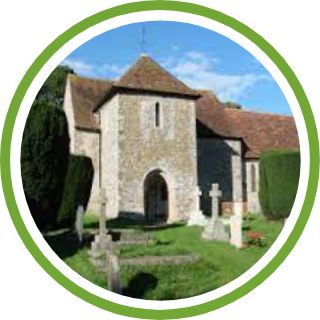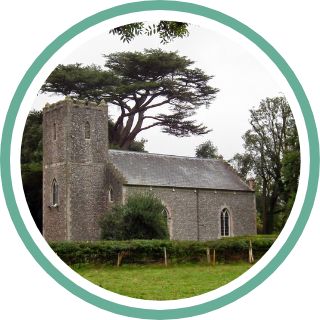Child Protection Procedures and Practice Guidelines
The House of Bishops' Policy document on Child Protection requires all clergy and lay people to maintain the highest professional standards in their work and relationships with children and young people. Children need to be safe from harm and adults need to be protected from false allegations or temptation.
A safe environment
Make sure that any church activity that involves children or young people is carefully organised, that the premises are safe and that there is sufficient help.
0-2 years 1 person for every 3 children
2-3 years 1 person for every 4 children
3-8 years 1 person for every 8 children
over 8 years 1 person for the first 8 children and then 1 extra person for every extra 12 children
A registration form must be filled in for all children and young people attending formal church activities and a register of attendance kept. Consent forms are required for off-site activities. Follow Diocesan recruitment procedures for all paid workers and volunteers.
No one with a conviction or caution for sexual offences against children is allowed to work with children or be part of a mixed-age activity.
The Diocesan booklet "The Parish Safeguarding Handbook"[2018] has the complete policy, procedures and requirements for good practice. These are all available on the Diocesan Safeguarding website and in hard copy from the parish safeguarding officer. This Parish also completes the Chichester Diocese Policy agreement at the Church AGM. This is displayed near the door of both St Mary’s and St Wilfrid’s church. Other policy documents are contained in safeguarding files located in both churches.
Officers Responsible for Safeguarding in the parish of Chidham
The Incumbent Name: Rev Andrew Birks 01243 – 341323 / 07485648655 or rev.andrew.birks@hotmal.com
The Parish Safeguarding Officer
Mrs Alyzn Johnson, Dunelm House, Ivydene Crescent, Chidham, Chichester
Tel: 01243 572079/ 07759550245 Email alyznj@gmail.com
Diocesan Safeguarding Adviser
Mr Colin Perkins
Tel: 01273 425792 / 07500 771210. Email: colin.perkins@chichester.anglican.org
Assistant Diocesan Safeguarding Advisor [Training]
Morag Keane
Tel: tel:07881 580310. Email: morag.keane@chichester.anglican.org
Code of behaviour All clergy, paid employees and volunteers should:
- Treat all children and young people with the respect and dignity befitting their age.
- Watch their language, tone of voice and body language.
- Learn to control and discipline children without physical punishment, this must never he used even if they have the parent's explicit permission for this.
- Ensure that another adult is informed if a worker needs to take a child to the toilet. Toilet breaks should be organised for young children.
- If known in advance, a parent's permission must be sought if a child or young person is to be seen on his or her own. Another adult must be nearby and the child or young person must know this.
- Ensure that each group includes a female helper.
Ensure that children and young people know that they can speak to an independent person in the parish, or contact "Childline", if they need to talk to someone. Have the "Childline" telephone number prominently displayed: 0800 1111.
Clergy, paid employees and volunteers should not:
- Invade a child's privacy whilst washing or toileting.
- Play rough physical or sexually provocative games.
- Be sexually suggestive about a child or to a young person, even in fun.
- Touch inappropriately or obtrusively.
- Scapegoat, ridicule or reject a child or young person.
- Show favouritism to any one child or young person or group.
- Allow a child or young people to involve the worker in excessive attention seeking that is overtly physical or sexual in nature.
- Give lifts to children or young people on their own. If this is unavoidable ask the child or young person to sit in the back of the vehicle.
- Share sleeping accommodation with young people.
- Invite a young person to the worker's home alone.
- Permit abusive peer activities, e.g. initiation ceremonies, ridiculing, bullying.
- Allow unknown adults access to children. Visitors should always be accompanied by a known person.
Be prepared for your colleagues to remind you if you forget any of the requirements for good practice and be prepared to help a colleague by advising them in return.
Children can be harmed by:
Physical abuse: neglect; emotional abuse; sexual abuse.
They can be harmed within their own families, by a trusted adult, by someone involved with them in an organised activity or sometimes, although rarely, by a stranger. All church workers with children must know what to do if they are concerned that a child or young person is being harmed or if they disclose abuse.
Hearing a child abuse disclosure
Church workers may get to know the children and young people in their groups very well. A child or young person may feel enough trust to be able to talk about unhappy things that are happening at home, at school or at church. This is both a privilege and a responsibility.
Remember that the child may want the abuse to stop but still love the abuser. The child may think that it is possible to stop the abuse without anything else happening. If a child asks to talk in confidence ALWAYS tell them that that will depend on the circumstances.
It will be necessary to get other people to help if they are being harmed. If possible, try to have another adult present whilst the child speaks, but do not prevent the child from speaking.
- Maintain eye contact ·
- Allow the child to talk, but don't press for information ·
- Tell the child that they are not to blame for anything that has happened ·
- Reassure the child that they were right to tell ·
- Let the child know that you will have to tell other people so that the abuse can stop.
- Try to explain what will happen next in a way that the child can understand. ·
- Reassure the child that you will support them during the difficult time to come
As soon as possible write down as carefully as possible what the child has said, how they said it and how they appeared emotionally. Write down what you said, sign and date it. Do not talk to the alleged abuser. Pass on the information to the Parish Child Protection Representative.
If child abuse is suspected or a child discloses abuse, the local Social Services Department must be informed. They will agree with the incumbent or Parish Child Protection Representative when the parents and alleged abuser will be informed of the allegation.
Advice can be obtained from the Diocesan Child Protection Adviser


